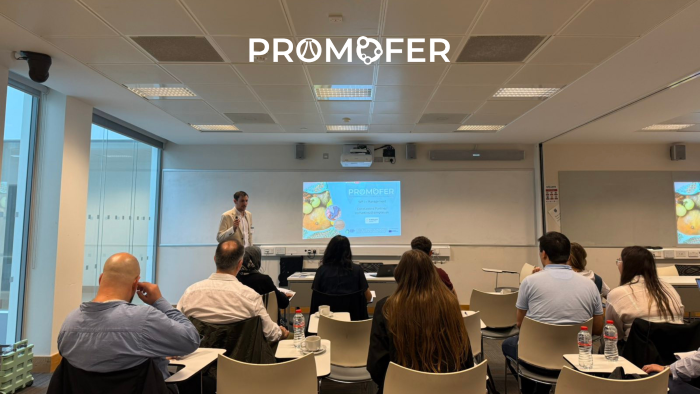PROMOFER Project: Transforming Agri-Food Waste into Sustainable Bioplastics

July 18, 2025
As the world confronts escalating environmental challenges and an urgent need to reduce reliance on fossil resources, bio-based and circular solutions have become critical to shaping a more sustainable future. One innovative initiative leading this charge is the PROMOFER project, funded by the European Union’s CBE-JU, which focuses on transforming agricultural and food industry residues into high-value bio-based compounds such as biodegradable plastics and sustainable polyurethane components.
Turning Waste into Value
The PROMOFER project aims to address key industrial bottlenecks in the fermentation processes of two valuable bio-based compounds: PHBV, a biodegradable bioplastic, and 2,3-BDO, an essential ingredient in the production of sustainable polyurethanes. Coordinated by AIMPLAS, the Plastics Technology Centre, this ambitious initiative valorizes a wide range of agri-food and lignocellulosic residues—including low-value starches, whey permeate, industrial wastewater, rice straw, wheat straw, and pruning waste.
These innovative approaches not only help reduce waste and greenhouse gas emissions but also foster a transition toward a resilient, resource-efficient European economy.
Achievements and Progress
In its first year, PROMOFER has achieved remarkable milestones. The project consortium, comprising 13 partners from seven European countries, gathered at University College Dublin to review progress on enzymatic hydrolysis, microorganism characterization, and initial production of volatile fatty acids (VFAs). These steps pave the way for scaling up fermentation processes and designing production systems for PHBV and 2,3-BDO.
The second cycle of collecting agri-industrial waste is underway, with analyses of collected residues already completed. This demonstrates the project’s capacity to transform widespread waste streams into sustainable materials for industrial applications.
Innovations Driving Sustainability
PHBV offers a biodegradable and bio-based alternative to conventional plastics, addressing one of the most pressing issues in waste management and environmental pollution. Meanwhile, 2,3-BDO serves as a chain extender in thermoplastic polyurethanes, contributing to the development of sustainable materials for diverse industries.
By improving fermentative processes and biocatalyst efficiency, PROMOFER is setting a new benchmark in the production of bio-based materials that can compete with traditional petrochemical processes.
A Vision for the Future
The project’s efforts in social acceptance and stakeholder engagement reflect its holistic approach to implementing circular bio-based solutions at scale. Running until June 2028, PROMOFER is poised to deliver significant advancements in bio-based waste treatments and industrial applications of sustainable bioplastics.
Read the original article here.
Sponsored by PWmat (Lonxun Quantum) – a leading developer of GPU-accelerated materials simulation software for cutting-edge quantum, energy, and semiconductor research. Learn more about our solutions at: https://www.pwmat.com/en
📘 Download our latest company brochure to explore our software features, capabilities, and success stories: PWmat PDF Brochure
📞 Phone: +86 400-618-6006
📧 Email: support@pwmat.com
Tags: bioplastics, PHBV, sustainable materials, fermentation processes, circular economy, PWmat

Comments
Post a Comment